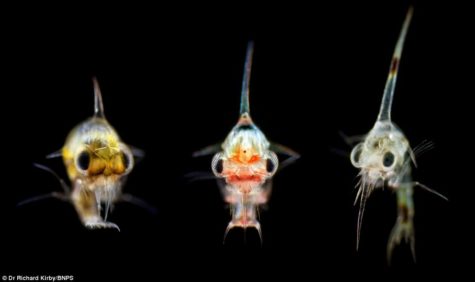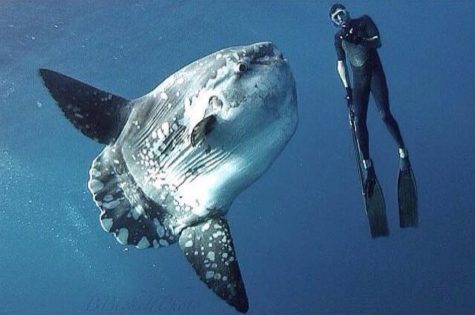The Value of an Adolescent
March 8, 2018

We, my friends, are plankton.
Plankton are microorganisms, unable to swim against the current of the ocean, that serve as a common source of food for many large aquatic organisms. In many ways, plankton can be seen as the lowest of the low when it comes to marine life. The term “plankton” itself comes from the Greek word “planktos” which means “wanderer.” Plankton all carry out the same day-to-day routine, and float helplessly; going wherever the water takes them.
As adolescents, we have similar feelings of helplessness, and worthlessness. We are “wanderers” following daily routines, with little authority or power to control our existence. In high school we learn the proper etiquette for writing prompts, and how to simplify and solve complex equations, but adolescence is something we have to do on our own. We can have guidance to an extent, but ultimately it is our time for personal growth, and we rarely know where to start.
We feel stuck because we desire to be independent, yet we are still under the care of our legal guardians and teachers. And we question our purpose because we do not yet have the freedom to accomplish all that we intend to achieve.
Ironically, because we long to be autonomous, we tend to follow one another; to copy each other’s attitudes and actions. It’s not always intentional, but we do it when we feel that our own personality may be inferior to theirs. We also fall victim to playing the roles that have been assigned to us by society; we carry on the stereotypes of our cliques. We are willing to give up our individuality temporarily because we think that doing-so may make us seem worthy of being unregimented.
That being said, I left out a few important details in my analogy. Plankton are actually crucial to the survival of marine life. As they drift peacefully, they are actually traveling to the top of the ocean for a process of photosynthesis. They have chlorophyll to capture sunlight, and they use photosynthesis to turn it into chemical energy. Then they return to the bottom of the ocean where they are surrounded once again by organisms that could easily consume them. In some species the release of this chemical energy can result in bioluminescence which is the emission of light by living organisms. But this journey that the plankton take daily is not the most impressive feat they accomplish.
When they return to the bottom, they provide an incredible 90 percent of photosynthesis in the ocean. And by doing so, they provide 50 percent of the oxygen we breathe as humans. On top of all of that, they make up the biggest daily migration in the world.
Plankton group together and carry out their purpose to provide for the creatures around them, even their predators. We may not have the freedom to be where we want to be, like plankton being swept along by the currents, but we can still try daily to make the best out of our situation. Through humor and socializing, we can keep ourselves uplifted while we work hard to excel in our education, and personal growth. And through hard work, we can improve even more so that one day we can impact the world in our own way.

When we copy our peers and follow a routine, we tend to forget how much meaning we hold as individuals. After infancy, the brain’s most dramatic growth spurt occurs in adolescence. Due to this increase in brain matter, our brains become highly interconnected.
The unfortunate fact of the matter is that we are more commonly seen for our irrational decisions, and our dependence on affirmation. We are rarely appreciated for our ingenuity. Our elders look down on us for being “immature”, but forget to acknowledge that we have dynamic, hungry minds. We are brave, creative, and curious. Adults seldom appreciate our new attributes – our grown-up conversation, our sense of humor, our passions, and our innovative ideas.
Youth is not a time in life; it’s a state of mind. It is not a time for earning grades, selecting a career, and choosing a college. It is instead a time to develop the quality of imagination, development, and will; it is the revolutionary thoughts of modern minds.
The majority of our emotional behavior can be explained by the changes that are taking place in our brains. What many adults fail to realize is that this can feel as confusing for us as it is to them. We are expanding our capacity to respond to the world in ways that will help us thrive. And this process should be encouraged, rather than criticized. Our elders see us as naive, but sometimes they forget that they can be naive too. Identity formation is a life-long process, and so is making self-improvements.
Our uniqueness should make us proud, not ashamed, because just like plankton our incredible diversity is one of our greatest attributes.
A certain type of plankton, called Molas, can grow up to an astounding 3,000 kilograms, and lay over 3 million eggs when reproducing. This is just one example of how plankton can be minuscule or colossal. Similarly, there is hardly any limit to what we can accomplish as adolescents. We must remember that our youth makes us distinctive and important in society, just like the plankton ecosystems’ roles are vital to the ocean’s carbon cycle and oxygen production around the world.
Our generation should feel empowered rather than underdeveloped; valuable rather than inadequate because we are youthful, and we are irreplaceable.